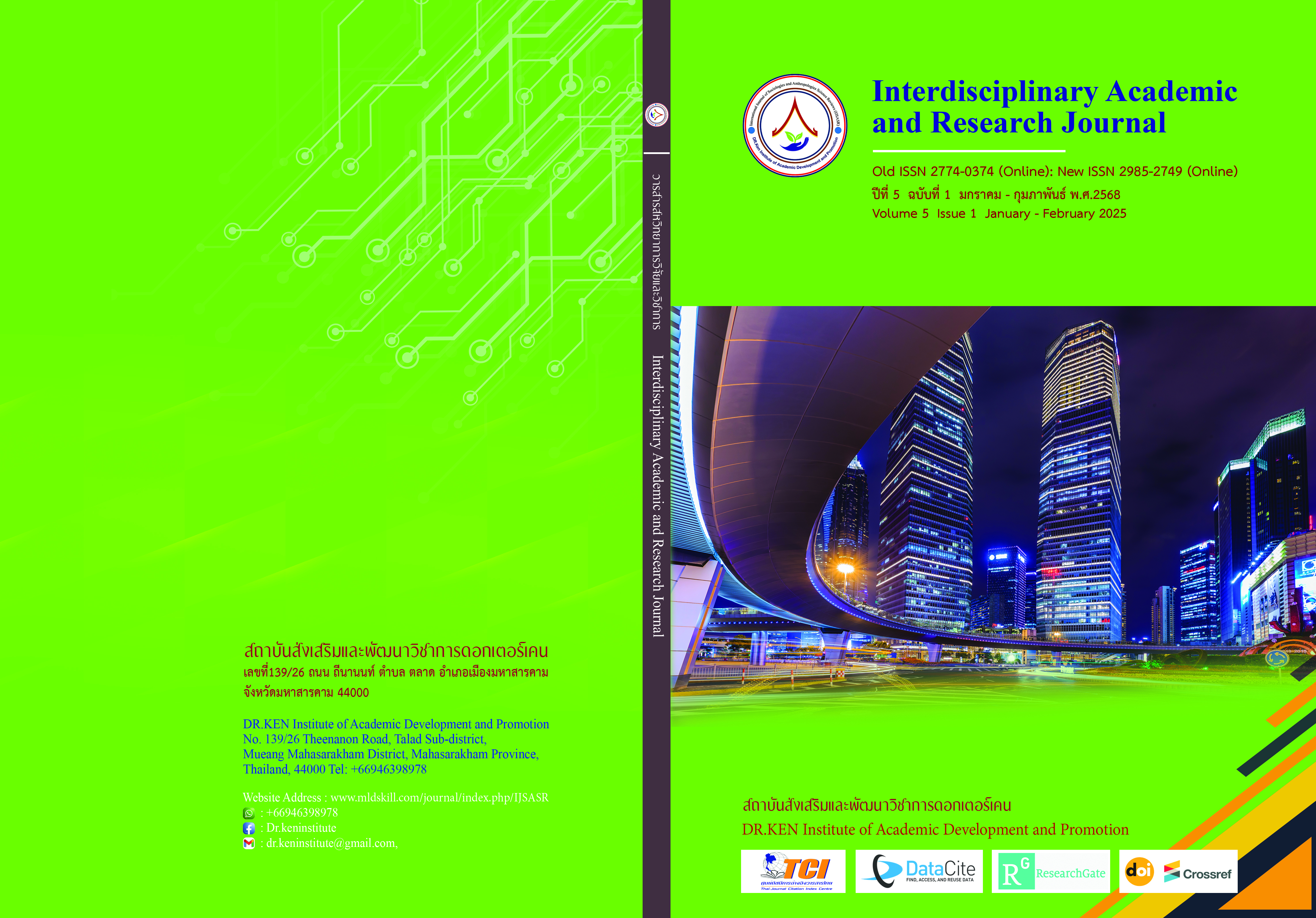The Development of the E-Learning Model for the Public Administration Program Dhonburi Rajabhat University
DOI:
https://doi.org/10.60027/iarj.2025.279760Keywords:
E-learning, Teaching management, Online learningAbstract
Background and Aims: COVID-19: Educational institutions in many countries, including Thailand, have adopted various technologies to facilitate online learning. The objectives of this research are 1) to study the problems and obstacles in teaching E-Learning to students in the Department of Public Administration, Dhonburi Rajabhat University. 2) to find a model suitable for teaching and learning E-Learning for students in the field of Public Administration, Dhonburi Rajabhat University.
Methodology: Key informants were specifically selected, including 73 students from the Public Administration program and 32 participants in focus group discussions between teachers and students. The method was in-depth interviews, utilizing semi-structured interview guides with open-ended questions. The data from the interviews were analyzed using content analysis.
Results: The results showed that the problems found in 3 aspects were 1) Teacher's problems such as lectures, and classroom supervision. Practice, exams, program implementation, proficiency, and equipment provision 2) Learner’s problems such as discipline, learning, interoperability, lack of concentration, lack of interaction, health, proficiency, and procurement of equipment, and 3) Equipment and technology problems such as internet signal stability, system stability, and device stability. The appropriate model is an e-learning system that is either a teaching system or online learning. In this approach, teachers plan and design teaching methods for distance learning, aiming to replicate the traditional classroom experience as closely as possible. This is achieved through the use of synchronous communication in the teaching and learning process.
Conclusion: The issues related to teaching and learning can be divided into three main aspects: the teacher, the students, and the equipment and technology. The appropriate teaching model is e-learning, where teachers should plan and design the instruction to closely resemble traditional classroom learning. Additionally, synchronous communication should be utilized to enhance the effectiveness of teaching and learning.
References
ฌานีกร ปรารถนารักษ์. (2558). การศึกษาสภาพการใช้ปัญหาและแนวทางแก้ไขปัญหาการใช้สื่ออิเล็กทรอนิกส์ในการเรียนการสอนวิทยาศาสตร์ ของครูระดับชั้นมัธยมศึกษาในโรงเรียน สังกัดสำนักงานเขตพื้นที่การศึกษามัธยมศึกษา จังหวัดพิจิตร. พิษณุโลก: มหาวิทยาลัยนเรศวร.
ฐาปนีย์ ธรรมเมธา. (2557). อีเลิร์นิ่ง: จากทฤษฎีสู่การปฏิบัติ. นนทบุรี: สหมิตรพริ้งติ้งแอนด์พับลิสชิ่ง.
นรินธน์ นนทมาลย์, นริศรา เสือคล้าย, กัลวรา ภูมิลา, สุมิตรา อินทะ และณัฐพงษ์ พรมวงษ์ (2564). การสำรวจปัญหาการจัดการเรียนการสอนออนไลน์ในหมวดวิชาศึกษาทั่วไปของนิสิตมหาวิทยาลัยพะเยา. วารสารเทคโนโลยีและสื่อสารการศึกษา, 6(20), 61-73.
ไพศาล สุขใจรุ่งวัฒนา. (2565). การศึกษาสภาพและปัญหาเพื่อพัฒนาระบบการเรียนการสอนภาษาจีนทางออนไลน์ของนักศึกษามหาวิทยาลัยมหิดล. วารสาร มจร พุทธปัญญาปริทรรศน์, 7(2), 104-116.
ภัสสรา จตุโชคอุดม, ชนิดา มิตรานันท์ และประพิมพ์พงศ์ วัฒนะรัตน์. (2565). สภาพปัญหาและความต้องการในการจัดการเรียนการสอนรูปแบบออนไลน์ สำหรับนักเรียนที่มีความต้องการพิเศษของนิสิตฝึกประสบการณ์วิชาชีพครู โรงเรียนสาธิตมหาวิทยาลัยศรีนครินทรวิโรฒ (ฝ่ายมัธยม). Journal of Modern Learning Development, 7(4), 265-286.
มาร์เก็ตติ้งออฟ. (2563). “COVID-19” ปฏิรูปการศึกษาทั่วโลก! ใช้เทคโนโลยีเรียนรูปแบบใหม่ – ‘มหาวิทยาลัยไทย’ สอนผ่านออนไลน์. Retrieved on 18 May 2020 from https://www.marketingoops.com/exclusive/business-case/covid-19-reinvent-global-education-system-with-educational-technology/
วิจิตร ศรีสอ้าน และคณะ. (2534). การศึกษาทางไกล. นนทบุรี: สำนักพิมพ์มหาวิทยาลัยสุโขทัยธรรมาธิราช.
ศยามน อินสะอาด. (2561). การออกแบบบทเรียน e-learning เพื่อพัฒนาทักษะการคิดชั้นสูง. กรุงเทพฯ: ซีเอ็ดยูเคชั่น.
ศิริเดช คำสุพรหม. (2563). CIBA_มธบ.ชี้ยุคโควิด-19 หลักสูตรการเรียนการสอนไทยต้องเปลี่ยนแปลง. Retrieved on 18 May 2020 from https://thailandinsidenew.com/2020/05/15/ciba_มธบ-ชี้ยุคโควิด-19-หลักสูต/
สมเกียรติ พรพิสุทธิมาศ และอรุณ ชาญชัยเชาว์วิวัฒน์. (2565). ปัญหาและความท้าทายในการจัดการเรียนรู้วิทยาศาสตร์: การจัดการเรียนรู้แบบออนไลน์ให้ประสบความสำเร็จ. วารสารวิทยาศาสตร์และวิทยาศาสตร์ศึกษา, 5(1), 172-180.
สำนักงานราชบัณฑิตยสภา. (2553). พจนานุกรมศัพท์ศึกษาศาสตร์ อักษร M-Z ฉบับราชบัณฑิตยสถาน. กรุงเทพฯ : ราชบัณฑิตยสถาน.
Downloads
Published
How to Cite
Issue
Section
License
Copyright (c) 2025 Interdisciplinary Academic and Research Journal

This work is licensed under a Creative Commons Attribution-NonCommercial-NoDerivatives 4.0 International License.
Copyright on any article in the Interdisciplinary Academic and Research Journal is retained by the author(s) under the under the Creative Commons Attribution-NonCommercial-NoDerivatives 4.0 International License. Permission to use text, content, images, etc. of publication. Any user to read, download, copy, distribute, print, search, or link to the full texts of articles, crawl them for indexing, pass them as data to software, or use them for any other lawful purpose. But do not use it for commercial use or with the intent to benefit any business.
















.png)


